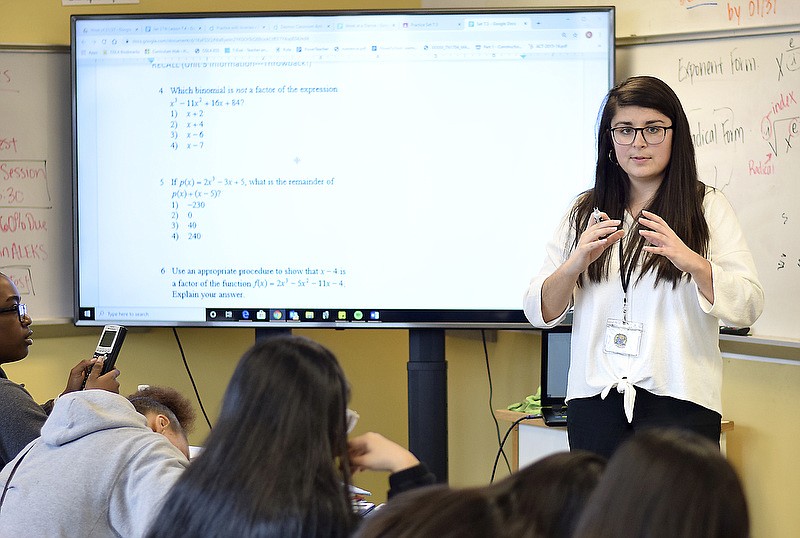It's a wonder anyone wants to be a public school teacher today, but thank goodness for the dedicated souls who do.
We bring this up because the Hamilton County Board of Education recently passed a code of conduct for teachers, which are the same or very nearly the same as those in the Tennessee Teachers' Code of Ethics.
We aren't against what's in it, but it's one more fine line they have to walk in addition to managing the masked or maskless health of their students, having to prepare at practically a moment's notice for online learning, completing mountains of bureaucratic paperwork, contending with little or no disciplinary power and, oh, yes, teaching and grading student work.
Before the code was approved recently, board member Marco Perez brought up an important point about a line in the policy stating teachers have to be careful with expressing themselves.
We imagine it was this phrase: "[E]mployees must take great care when exercising their own freedom of expression to be alert how their views may impact a student's or parent's perception of the educator so as not to create unnecessary barriers to the education process."
"We live in an environment right now where it's almost impossible to express something that won't alienate people or create barriers," Perez said.
He is right, and he could have as easily have been talking about a classroom discussion as a social media post about politics or alternative lifestyles.
Most businesses today have social media policies, so teachers who sign a contract that they will adhere to the district's policy have only themselves to blame if they violate it and are caught.
But what concerns us more is the worry teachers may have about expressing themselves as part of a class discussion. A good teacher is able to deftly moderate a discussion in which various student opinions are debated without taking a side, but there inevitably will be times in which the teacher - perhaps even playing devil's advocate - offers an opposing viewpoint.
The Tennessee General Assembly's outlawing of critical race theory instruction earlier this year comes to mind. We agree that critical race theory, where every aspect of society is examined through a lens of race, has no business being taught in K-12 schools. But that should not preclude talking about race, its role in history or about civil rights. And while the Tennessee Department of Education has provided some guidelines on this issue, teachers still may feel pressure about what they can say.
That's unfortunate because a vital part of teaching is stimulating critical thinking, not advocating critical race theory.
It's a shame, generally, there has to be a code of conduct for teachers. If we bring up what happened "back in the day," we risk being labeled "over the hill," but most teachers in the not-so-distant past were older women who wore sensible shoes or were traditionally married women or men whose worst vice was sneaking a cigarette in the teacher's lounge.
We recall, for instance, the straight-laced high school biology teacher who, not wanting to delve deeply into a sexual reproduction chapter, summed up the material by saying, "The only thing I've ever done behind my wife's back is zip up her zipper."
On the other hand, a code of conduct might have been apt for another teacher whose temper occasionally got the best of her. Words in the code such as "conducts themselves in a manner that preserves the dignity and integrity of the education process," "maintain a professional approach with students" and "protecting their emotional well-being" would have applied.
She was the elementary school music teacher who, upon seeing one student leaning back in his folding chair, gave him a push and said, "I hope you fall." She also once got the attention of the class by throwing a book across the room until it slammed with a loud bang against a row of metal lockers.
Back in the day, too, few people had to worry about the "parent's perception of the educator." To the parent, the teacher's word was law, and if a teacher had to tell a parent what their child did, the child might be able to look forward to some additional consequences at home.
What we firmly hope is that the district's new code of conduct doesn't become a springboard from which a raft of new investigations or lawsuits emerge.
After all, it does, as critics point out, have some vague language like: "Employees must protect the health and safety of students." When teachers are unable to intervene in altercations and unable to insist all of their students wear masks, such a task is practically impossible.
The best we can probably hope is that teacher infractions are very few but clear, like the 1964 description of obscenity by U.S. Supreme Court Justice Potter Stewart.
In his decision on a pornography case, he said he couldn't begin to define such material, "but I know it when I see it."
As such, we hope teachers will use discretion in what they say and do and parents will provide a little leeway to allow the proper teaching of material so their students can think and grow.
And then perhaps a young relative's recent whispered revelation will be the only kind of conduct for which teachers are known: "He rides a skateboard."
